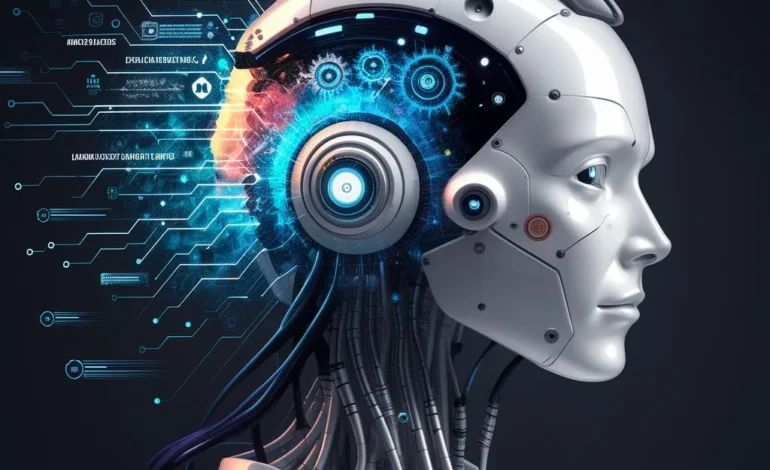Machine Learning in AI Development is a subfield that ensures that systems get better at their work through exposure to data. There exist copious amounts of information that the employment of ML algorithms can analyze to expose patterns and make predictions to push particular innovations in several sectors. With the advance in the maturity of AI applications, there is a critical need for machine learning to improve capacity and effectiveness. Join the Artificial Intelligence Course in Chennai, which enhances your understanding of machine learning algorithms.
Understanding Machine Learning in AI
ML is an area of artificial intelligence (AI) that centers on the possibility of giving a computer the capability to learn from data and make productive use of what it learns. This capability is essential for developing artificial intelligence since it introduces the ability of the system to fine-tune its actions without being exactly coded to do a particular task or to accomplish a particular goal. ML uses statistical methods to allow machines to understand patterns and respond accordingly by making decisions. By harnessing large datasets, ML algorithms can train models to recognize complex structures and relationships, laying the groundwork for advanced AI applications.
Must Read: Fintechzoom Meta Stock Trends: Analyzing Market Shifts
Enhancing Predictive Analytics
Another function of machine learning in AI development is strengthening prediction capability. ML algorithms are used extensively in businesses and organizations because the latter needs accurate predictions to enable informed decisions. It can predict future outcomes based on the data input it receives, which a human analyst cannot do because the data is large and complex and it may take him or her days to discover these patterns when they can be discovered in a couple of hours by the software. For instance, the use of ML models in finance to predict the future trend of stock in the market enhances the investor. Likewise, in the healthcare sector, it can examine people’s data records to identify diseases’ spreading trends or patients’ therapy results for the enhancement of customers’ and resources’ services.
Automating Decision-Making Processes
Well, Machine learning is significant in manner that helps make decision-making automatic in many fields and sectors. The incorporation of ML models assists organizations in negating time in many activities that the human mind has to spend a lot of time doing. For instance, in manufacturing, predictive maintenance powered by ML can forecast equipment failures, allowing companies to schedule repairs proactively and minimize downtime. In the customer service sector, chatbots utilize ML to grasp and answer customer requests automatically, improving performance and customer delight while reducing operational costs.
Must Read: FintechZoom Rolex Submariner: Navigating Luxury with an In-Depth Review
Personalization of User Experience
Another significant impact of machine learning on AI development is its ability to personalize user experiences. Businesses then use ML algorithms to understand user behavior and advocate for specific products as a result. Netflix and Spotify are some of the most used service providers that tap into ML to analyze consumers’ viewing and listening patterns and offer them product recommendations that will interrelate with them closely. This kind of segmentation enhances customer satisfaction and increases retention because no one would want to leave content that is so related to their preferences. Enrolling in the Artificial Intelligence Course in Bangalore will deepen the understanding of AI concepts.
Enabling Natural Language Processing
Organizations use machine learning to enhance natural language processing (NLP), enabling machines to process and analyze human speech and writing effectively. Using context extraction and other techniques in the field of machine learning, the computers become capable of processing huge amounts of plain text data and beginning to identify questions, tone, and purpose. This is embodied in applications whose ML element enables them to interpret voice commands properly. Further, more and more ML translation tools are getting smarter at generating language translations, removing language barriers to communication.
Must Read: Maximizing Returns: Leveraging FintechZoom Costco Stock Analysis
Driving Innovation in Autonomous Systems
Machine learning enables the creation of self-driving cars, drones, and fully automated systems seen today. Due to the requirement to travel and avoid obstacles, these systems identify travel through this environment based on sensor information in real time. These enable the distinctive ML algorithms to decide on these vehicles to learn from past incidences. For example, cars employing the self-driving system use ML for object identification from cameras, radar, and Light Detection And Ranging(LIDAR), for identifying limits, pedestrians, and signs. This learning process must go on for the improvement of safety and reliability in the systems that use autonomous technologies.
The Future of Machine Learning in AI
It means that the role of machine learning in AI development is going to grow even more in the future years. The requirement for superior ML algorithms will also rise based on the continuous generation of massive data. Prospects for further development of deep learning, which is a subfield of ML that uses neural networks to model the required patterns, will improve computer vision and speech recognition and generate models. In addition, the synergy of ML with other revolutionizing technologies like IoT and blockchain will open new separate opportunities for applying AI in different fields. This implies that organizations must adopt ML to stay relevant in the future, where data will be the only language.
Must Read: Crypto FintechZoom Spotlight: Examining the Future of Money in the Digital Age
ML is an essential component of Artificial Intelligence because it delivers the instruments that a system requires to learn and make decisions on its own. They are used in various industries as optimization tools and enable a tailored approach to the user. Accompanied by the development of technology, the significance of machine learning in the development of AI in the future will be a new opportunity and challenge.















